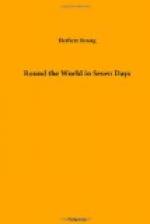“Really, I’ve nothing to tell. You appear to know a good deal about me already, and I’m sure your imagination can supply the rest.”
“But there’s a gap, lieutenant. We can’t account for you between Port Darwin and Honolulu.”
“We’re wasting time,” said Smith despairingly. “Be so good as to order up the petrol; then I’ll give you a few headings.”
McMurtrie was delighted. He gave the order to a firm in the city, requesting that the petrol should be sent out by motor at once. Then he took Smith and Cleave into the luncheon-room, which they had to themselves, ordered a meal for Smith, and drinks for Cleave and himself, and while Smith was eating, filled his note-book with jottings, which he foretold would sell out two editions of his paper like winking.
Rodier, meanwhile, was cleaning the engine.
To execute an order smartly is one of the first of business virtues. Smith was satisfied that the virtue was appreciated in Toronto: the petrol arrived, as McMurtrie assured him, in the shortest possible time. Unluckily the Toronto men of business had their share of humanity’s common failing—if it is a failing—curiosity. McMurtrie, with Smith at his elbow, had scrupulously refrained from explaining what the petrol was wanted for; his assistant, Daniels, had been too busy seeing the special edition to press to run about gossiping; and Davis, the shorthand-writer, the third in the secret, had become so mechanical that nothing stirred emotion within him; he wrote of murders, assassinations, political convulsions, Rooseveltian exploits, diplomatic indiscretions, everything but football matches, with the same pencil and the same cold, inhuman precision. But it happened that one of the compositors in the Sphere printing office, who took a lively interest in the affairs of his fellow mortals, had a bet with a friend in the plumbing line about this very matter of the mysterious flying men. No sooner had he set up his portion of the editor’s note than he begged leave of absence for half-an-hour from the overseer, whipped off his apron, and rushed off to demand his winnings before the loser had time to spend them in the Blue Lion on the way home from work. They repaired, nevertheless, to the Blue Lion to settle their account; they told the news to the barman, who passed it to the landlord; a publisher’s clerk heard it, and repeated it to the manager; the manager acquainted the head of the firm as he went out to tea; the publisher mentioned it in an off-hand way to the man next him at the cafe; and—to roll the snowball no further—half Toronto was in possession of the news before the Sphere appeared on the streets.
The result was a general exodus in the direction of the Scarborough Bluffs. On foot, on bicycles, in cabs, motor-cars, trolley-cars, drays, and all kinds of vehicles, every one who had a tincture of sporting spirit set off to see two men and a structure of metal and canvas—quite ordinary persons and things, but representing a Deed and an Idea.




